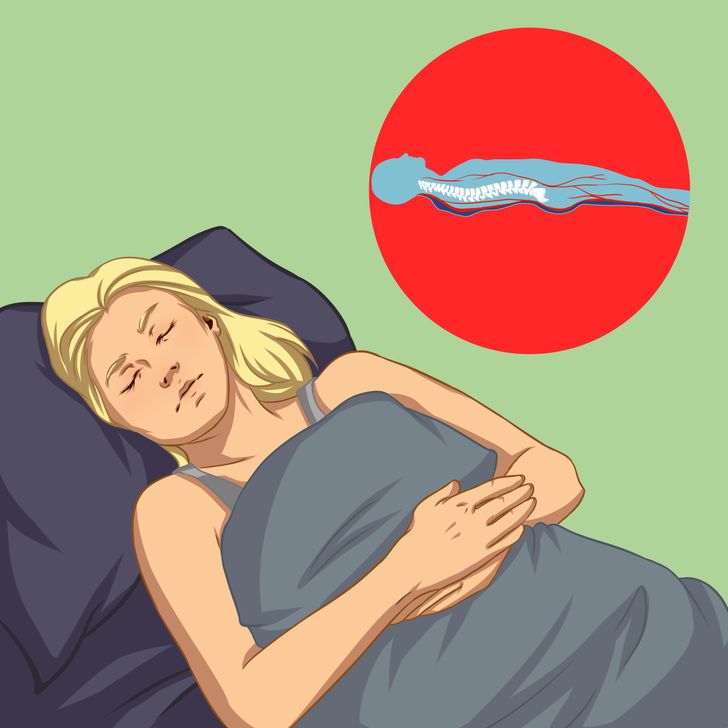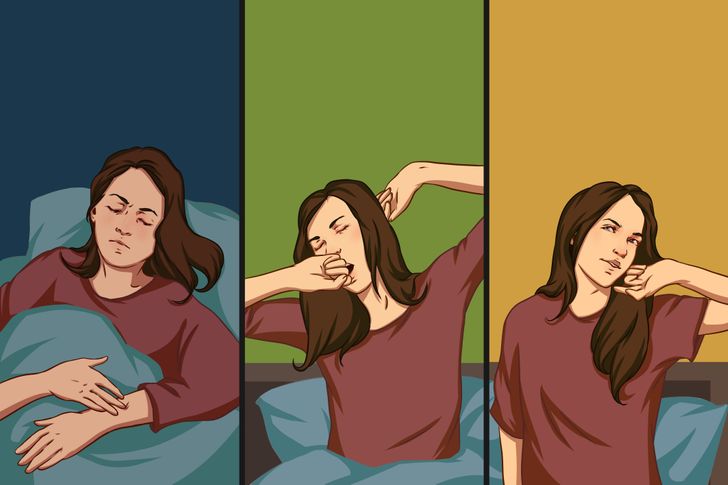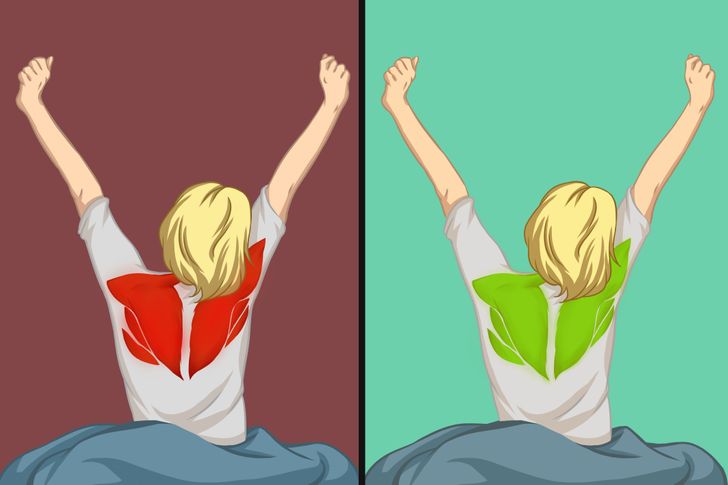Have you ever wondered why, upon waking up, your body instinctively stretches and you let out a big yawn? These natural behaviors are not random; they play a significant role in preparing your body and mind for the day ahead. From realigning muscles and reducing stress to enhancing brain signals and maintaining alertness, stretching and yawning are crucial components of a healthy morning routine. In this comprehensive guide, we explore why we instinctively stretch and yawn when we wake up and delve into the many benefits of these actions.
For more detailed insights into healthy morning habits, check out expert resources like Mayo Clinic and Healthline.
Stretching Realigns Your Muscles: Kick-Starting Your Body’s Mechanics

When you stretch in the morning, you’re not just waking up your body; you’re actively realigning your muscles to prepare for the day ahead.
The Science Behind Stretching
- Muscle Realignment and Flexibility: During sleep, your muscles can become slightly contracted or stiff. Stretching helps realign these muscles, promoting flexibility and optimal movement.
- Enhanced Blood Flow: Stretching stimulates blood circulation, ensuring that oxygen and essential nutrients are efficiently delivered to muscle tissues. This increased circulation is key for muscle recovery and overall performance.
- Prevention of Injury: By gently stretching, you prepare your muscles and joints for activity, reducing the risk of strains and sprains later in the day.
Practical Tips for Effective Stretching
- Focus on Major Muscle Groups: Start with your neck, shoulders, arms, and legs. Gentle, full-body stretches can help relieve any tension built up during sleep.
- Incorporate Dynamic Movements: Incorporating dynamic stretches, such as leg swings or arm circles, can further stimulate circulation and muscle activation.
- Consistency is Key: Making stretching a regular part of your morning routine can lead to long-term benefits in flexibility and overall health.
For additional stretching techniques and benefits, visit Healthline’s stretching guide.
Decreasing Stress: How Morning Stretching Can Ease Your Mind

Stress is an inevitable part of life, but starting your day with stretching can help lower cortisol levels and set a calm tone for the day ahead.
The Stress-Reducing Benefits of Stretching
- Lowering Cortisol Levels: Stretching helps reduce the production of cortisol, the stress hormone, which in high levels can lead to anxiety, fatigue, and weight gain.
- Mind-Body Connection: Focusing on your body while stretching encourages mindfulness, allowing you to clear your mind of stress and worries.
- Improved Mood: Physical activity, even light stretching, releases endorphins—the body’s natural mood elevators—enhancing your overall sense of well-being.
Incorporating Mindfulness into Your Routine
- Deep Breathing: Pair your stretches with deep breathing exercises. Inhale deeply as you extend your muscles and exhale slowly to release tension.
- Focus on the Moment: Concentrate on how your muscles feel and the movement of your body. This practice can turn your morning stretch into a mini meditation session.
- Set an Intention: Use this time to set a positive intention for the day. This mental preparation can significantly impact your mood and productivity.
For more on stress management and mindfulness techniques, explore articles on Mayo Clinic’s stress relief section.
Relieving Stiffness and Tightness: Restoring Mobility for a Fresh Start

Waking up with stiff muscles is a common complaint, especially as we age. Morning stretching can help alleviate this stiffness and restore mobility.
How Stretching Eases Stiffness
- Increases Joint Mobility: Regular stretching loosens tight muscles and improves the range of motion in your joints, making daily movements easier and less painful.
- Reduces Muscle Tension: By releasing tension in your muscles, stretching can help alleviate aches and discomfort that build up overnight.
- Enhances Posture: Stretching the muscles of the back, shoulders, and neck can improve posture, reducing the risk of chronic pain and injuries.
Effective Techniques for Relieving Tightness
- Gentle Yoga Poses: Incorporate simple yoga stretches such as the cat-cow stretch or child’s pose, which target areas prone to stiffness.
- Gradual Progression: Start slowly and gradually increase the intensity of your stretches as your muscles warm up.
- Stay Consistent: Regular stretching is essential for long-term relief from stiffness and tightness.
For additional tips on improving flexibility and reducing muscle tension, visit Yoga Journal.
Enhancing Brain-Muscle Communication: Strengthening Neural Pathways

Stretching in the morning does more than just wake up your muscles—it also plays a critical role in enhancing the signals between your brain and your muscles.
The Role of Neural Activation
- Boosting Neural Efficiency: Regular stretching helps strengthen the communication pathways between your brain and your muscles. This improved neural connection can enhance coordination and overall physical performance.
- Preventing Injuries: When your brain sends strong, efficient signals to your muscles, it can better coordinate movements, reducing the risk of accidental strains or falls.
- Cognitive Benefits: A well-activated nervous system supports not only physical coordination but also cognitive functions like focus and concentration.
Practical Strategies for Neural Activation
- Mindful Movement: Engage in slow, deliberate stretching that encourages you to feel each movement. This mindfulness can enhance your brain’s awareness of your body.
- Balance and Coordination Exercises: Integrate balance exercises into your morning routine to further strengthen brain-muscle communication.
- Regular Physical Activity: Beyond stretching, consistent exercise reinforces neural pathways, supporting both physical and cognitive health.
For more information on the relationship between exercise and brain health, refer to Harvard Health Publishing.
How Yawning Keeps You Awake: The Paradox of Sleep and Alertness

Yawning is a common, often misunderstood behavior. While many believe yawning is a sign of tiredness, it also plays an essential role in maintaining alertness, especially in the morning.
The Science Behind Yawning
- Brain Cooling: One theory suggests that yawning helps cool the brain, allowing it to function more efficiently. This cooling mechanism may be critical in transitioning from sleep to wakefulness.
- Increased Oxygen Intake: Yawning can increase oxygen intake and improve blood flow, which may help boost mental alertness and energy levels.
- Social and Behavioral Signals: Yawning has also been linked to social communication and can help synchronize group behavior, although its primary role in maintaining wakefulness is still being studied.
Yawning’s Role in Your Morning Routine
- Waking Up Your Body: A good yawn in the morning can help signal to your brain that it’s time to wake up, setting the stage for increased alertness throughout the day.
- Complementing Stretching: When combined with stretching, yawning contributes to a holistic wake-up routine that prepares both your body and mind for the day’s challenges.
- Natural Energy Boost: Rather than reaching for caffeine immediately, allowing your body to naturally stimulate alertness through yawning and stretching can lead to more sustainable energy levels.
For further reading on the science of yawning and its benefits, check out research summaries on PubMed.
Conclusion: Embrace the Power of Your Morning Rituals
From stretching to yawning, the natural behaviors we exhibit each morning are far from random—they are essential to our physical and mental well-being. By realigning your muscles, reducing stress, easing stiffness, enhancing brain-muscle communication, and maintaining alertness, these simple actions lay the groundwork for a healthy, productive day.
Integrating these practices into your daily routine can lead to a myriad of benefits, from improved flexibility and reduced injury risk to enhanced cognitive function and sustained energy levels. The next time you wake up, take a few extra minutes to stretch deeply and allow yourself a hearty yawn. Not only will you feel more awake, but you’ll also be setting your body up for success throughout the day.
Remember, consistency is key. Making these natural behaviors a habit can lead to lasting improvements in your overall health. Stay informed and experiment with different routines to see what works best for you. For more expert tips on healthy living and morning rituals, explore trusted resources like Mayo Clinic, Healthline, and Harvard Health Publishing.
Embrace the power of your body’s natural wake-up signals and discover the transformative benefits of a well-executed morning routine. Your journey to better health and enhanced productivity starts with a simple stretch and a good, revitalizing yawn.
This article is for informational purposes only and should not replace professional medical advice. Always consult with a healthcare provider for personalized recommendations on physical activity and wellness practices.









Leave a Reply